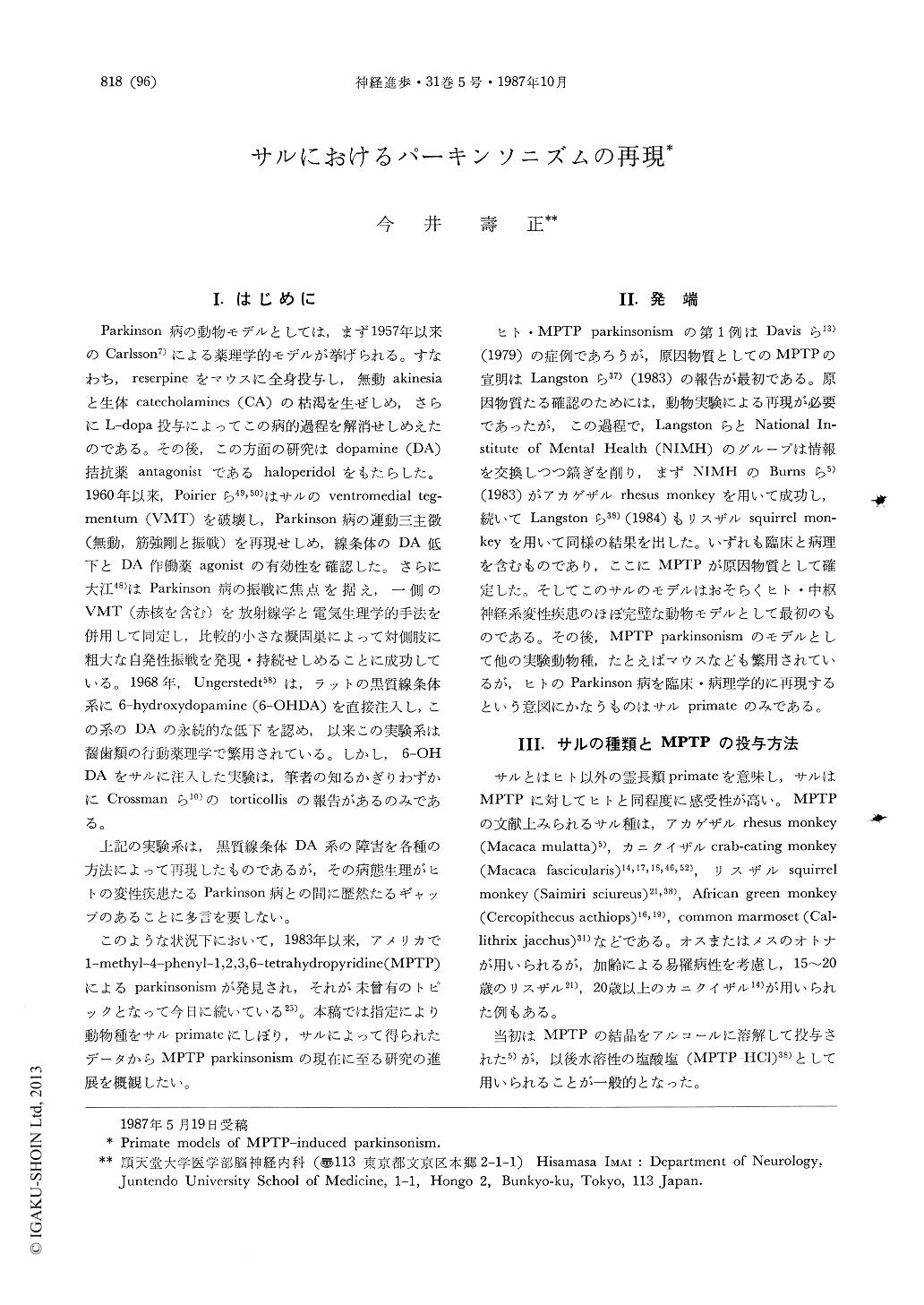Japanese
English
- 有料閲覧
- Abstract 文献概要
- 1ページ目 Look Inside
I.はじめに
Parkinson病の動物モデルとしては,まず1957年以来のCarlsson7)による薬理学的モデルが挙げられる。すなわち,reserpineをマウスに全身投与し,無動akinesiaと生体catecholamines(CA)の枯渇を生ぜしめ,さらにL-dopa投与によってこの病的過程を解消せしめえたのである。その後,この方面の研究はdopamine(DA)拮抗薬antagonistであるhaloperidolをもたらした。1960年以来,Poirierら49,50)はサルのventromedial tegmentum(VMT)を破壊し,Parkinson病の運動三主徴(無動,筋強剛と振戦)を再現せしめ,線条体のDA低下とDA作働薬agonistの有効性を確認した。さらに大江48)はParkinson病の振戦に焦点を据え,一側のVMT(赤核を含む)を放射線学と電気生理学的手法を併用して同定し,比較的小さな凝固巣によって対側肢に粗大な自発性振戦を発現・持続せしめることに成功している。1968年,Ungerstedt58)は,ラットの黒質線条体系に6-hydroxydopamine(6-OHDA)を直接注入し,この系のDAの永続的な低下を認め,以来この実験系は齧歯類の行動薬理学で繁用されている。しかし,6-OHDAをサルに注入した実験は,筆者の知るかぎりわずかにCrossmanら10)のtorticollisの報告があるのみである。
上記の実験系は,黒質線条体DA系の障害を各種の方法によって再現したものであるが,その病態生理がヒトの変性疾患たるParkinson病との間に歴然たるギャップのあることに多言を要しない。
The discovery of permanent human parkinsonism due to 1-methyl-4-phenyl-1,2,3,6-tetrahydropyridine (MPTP) and the subsequent production of MPTP-induced monkey parkinsonism in 1983 have resulted in a great impact on both the clinical and basic research fields of Parkinson's disease. Its intravenous, intraperitoneal or intramuscular injection or even oral administration to monkeys causes a clinical syndrome almost identical to Parkinson's disease with a good response to L-dopa and/or dopamine agonist therapy and a selective degeneration of the substantia nigra pars compacta. Using a protracted MPTP regimen and older monkeys, locus coeruleus lesions and eosinophilic inclusion bodies have also been reported. In contrast to its marked effects in primates, MPTP has been much less effective in lower animal species, especially rodents. Mechanism of action of MPTP with theories on anatomic and species selectivity were reviewed, including the discussion whether the principal damage to nigrostriatal neurons is incurred at the nerve terminal or cell body. Finally, various kinds of ongoing experimental research works using MPTP monkey were described. These approaches will greatly promote our understanding of both Parkinson's disease and the functions of the basal ganglia and dopamine system.

Copyright © 1987, Igaku-Shoin Ltd. All rights reserved.


